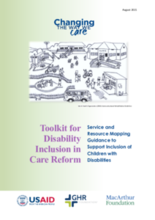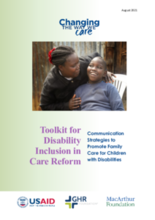This section includes resources related to children with disabilities and the COVID-19 pandemic.
Displaying 11 - 20 of 50
This guidance specifically refers to mapping of services as the process of locating and sharing information to a wide range of people about available services to support children with disabilities and their families.
The terminology and tips that follow may help as you use the Toolkit for Disability Inclusion in Care Reform and apply its principles to your program activities. It is recommended that you become familiar with these terms before reading the rest of the content and revisit as needed. Please keep in mind that disability is an evolving concept. Language that is preferred in one context may be different in another. Ask local organizations of persons with disabilities (OPDs) for the preferred terms in your language and country text.
In this document, the awareness raising and advocacy is on behalf of or to benefit children with disabilities—many of whom may struggle to communicate because of their disability or whose voices are not heard—and because adults, systems and services often do not consider the opinions of children and children with disabilities are often left behind in changing or improving systems of care.
This facilitator’s guide accompanies the workshop slides by the same title, 'Introduction to the Identification of Developmental Delay and Disability' as part of the Toolkit for Disability Inclusion in Care Reform. It is designed to be used by the person providing the workshop.
This facilitator’s guide accompanies the workshop slides by the same title, Understanding Disability. It is designed to be used by the person providing the workshop, often called “the facilitator” or “the trainer”. It is suggested that participants familiarize themselves with other resources in the Toolkit for Disability Inclusion in Care Reform as a foundation for this workshop. Each session section of this guide provides the facilitator with a script; however it should not be read verbatim but rather adjusted to the facilitator’s own style. Scripts will appear in italic font. The section description includes content for lecture with accompanying slides, suggested handouts, and exercises.
These slides were designed by disability and care reform practitioners and consultants for CTWWC with an aim to build the capacity and confidence of those working in family strengthening and children’s care for work with children with disabilities and their families. These slides are designed to be used by the person providing the workshop, often called “the facilitator” or “the trainer”.
The Facilitator Manual for the Participation & Advocacy Learning Workshop and the accompanying slides were designed by disability and care reform practitioners and consultants for CTWWC with an aim is to build the capacity and confidence of those working in family strengthening and children’s care for work with children with disabilities and their families.
The Facilitator Manual for Understanding Disability, a training in disability inclusion, and the accompanying slides were designed by disability and care reform practitioners and consultants for CTWWC with an aim is to build the capacity and confidence of those working in family strengthening and children’s care for work with children with disabilities and their families.
The Facilitator Manual for the Participation & Advocacy Learning Workshop and the accompanying slides were designed by disability and care reform practitioners and consultants for CTWWC with an aim is to build the capacity and confidence of those working in family strengthening and children’s care for work with children with disabilities and their families.
In this article, researchers Philip Fisher, Joan Lombardi, and Nat Kendall-Taylor present data from the RAPID-EC U.S. national survey of families with young children and look back at three overarching findings from the first year of the survey.






